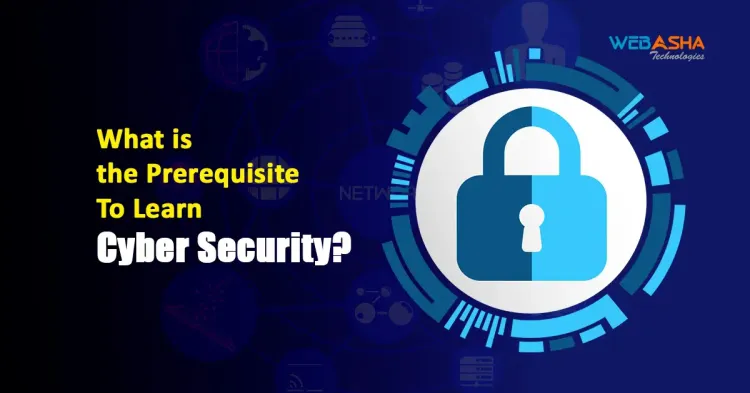What Is The Prerequisite To Learn Cyber Security?
Discover the essential prerequisites for learning cybersecurity, including basic computer literacy, networking concepts, programming skills, and a strong commitment to continuous learning. Start your journey into cybersecurity with the right foundation.

Cybersecurity has become a critical field in today's digital age, where protecting sensitive data and systems from cyber threats is essential for individuals and organizations alike. As the demand for cybersecurity professionals continues to rise, many people are eager to enter this field. However, one common question arises: What are the prerequisites to learn cybersecurity? Understanding these foundational requirements can help you prepare for a successful journey into the world of cybersecurity.
what is cybersecurity?
Cybersecurity is the practice of protecting systems, networks, and data from digital attacks, unauthorized access, and damage. It involves implementing security measures to safeguard information and ensure the integrity, confidentiality, and availability of data in the digital world.
Prerequisites To Learn Cybersecurity
Basic Computer Literacy
Before diving into cybersecurity, you must have a solid understanding of basic computer operations. This includes familiarity with operating systems (Windows, Linux, macOS), navigating file systems, and understanding how software applications work. Basic computer literacy ensures you can comfortably work with the tools and technologies commonly used in cybersecurity.
Understanding of Networking Concepts
A fundamental knowledge of networking is crucial for cybersecurity. Cybersecurity professionals need to understand how data is transmitted over networks, the various protocols involved (such as TCP/IP, HTTP, DNS), and how to secure these communications. Key concepts like IP addressing, subnetting, routing, and network devices (routers, switches, firewalls) are essential for identifying and mitigating network vulnerabilities.
Basic Programming Skills
While not always mandatory, having some programming skills can be highly beneficial in cybersecurity. Understanding how code works allows you to identify potential vulnerabilities in software and develop scripts to automate tasks. Languages like Python, Bash, and JavaScript are commonly used in cybersecurity for tasks such as scripting, automating processes, and analyzing malware.
Familiarity with Operating Systems
A good grasp of various operating systems, especially Linux, is important in cybersecurity. Many security tools and platforms are Linux-based, so being comfortable with Linux command-line operations, file permissions, and system administration can give you an edge. Additionally, knowledge of Windows and macOS environments is also valuable, as you may need to secure systems across different platforms.
Awareness of Cybersecurity Fundamentals
Before specializing, it's essential to understand the basics of cybersecurity. This includes learning about different types of cyber threats, such as malware, phishing, and social engineering, as well as the principles of risk management, encryption, and access control. A strong foundation in these areas will prepare you for more advanced topics and help you make informed decisions in real-world scenarios.
Willingness to Continuously Learn
Cybersecurity is a rapidly evolving field, with new threats and technologies emerging constantly. A strong commitment to continuous learning is crucial. Staying updated with the latest developments, tools, and best practices through certifications, online courses, and industry events is key to remaining effective in the cybersecurity landscape.
Conclusion
The prerequisites to learn cybersecurity are not overly complex, but they do require a combination of technical knowledge, problem-solving skills, and a passion for continuous learning. By building a strong foundation in computer literacy, networking, operating systems, and cybersecurity fundamentals, you’ll be well-prepared to embark on a rewarding career in cybersecurity. Whether you’re just starting or looking to advance in the field, these prerequisites will set you on the path to success.
FAQs
1. Do I need a technical background to start learning cybersecurity?
Basic technical knowledge in computers and networking is helpful, but not mandatory. You can acquire these skills as you progress.
2. Is programming necessary for cybersecurity?
Basic programming is beneficial but not always required. Learning languages like Python can help automate tasks and understand vulnerabilities.
3. Can I learn cybersecurity without prior IT experience?
Yes, with dedication and the right resources, you can start from scratch. However, prior IT knowledge can make the learning curve easier.
4. How important is networking knowledge for cybersecurity?
Networking is crucial, as many cybersecurity concepts involve securing data transmission and understanding network vulnerabilities.
5. Do I need to know Linux to learn cybersecurity?
Familiarity with Linux is highly recommended, as many security tools are Linux-based. However, you can learn it as you go.
6. Is continuous learning necessary in cybersecurity?
Absolutely. Cybersecurity is a rapidly changing field, and staying updated with new threats and technologies is essential for success












![Top 10 Ethical Hackers in the World [2025]](https://www.webasha.com/blog/uploads/images/202408/image_100x75_66c2f983c207b.webp)



![[2025] Top 100+ VAPT Interview Questions and Answers](https://www.webasha.com/blog/uploads/images/image_100x75_6512b1e4b64f7.jpg)







